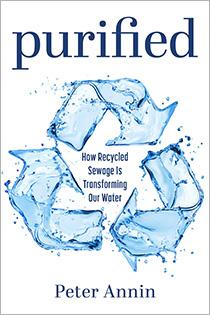When it Comes to Pollution, How Much is Too Much?
The late Justice Crooks once wrote for a majority of the Wisconsin Supreme Court that “general standards are common in environmental statues . . . [and] the fact that [they] are broad standards does not make them non-existent ones.” That principle is about to be tested in both the United States Supreme Court and the Wisconsin Supreme Court. General standards (or, as their opponents often call them, vague standards) may be “common in environmental statutes,” but they are also becoming extremely controversial, as demonstrated in a pair of current cases.
The first is a federal matter, City and County of San Francisco v. Environmental Protection Agency, in which the United States Supreme Court granted certiorari on May 28. The case concerns regulatory agencies’ authority under the Clean Water Act (CWA) to issue “narrative” standards, or statements that describe a water quality goal when numeric standards are too difficult to quantify. The permit provision at issue prohibits a wastewater treatment facility from “causing or contributing to” a violation of water quality standards, and from discharging substances that “create pollution, contamination, or nuisance.” The appellant municipalities say those standards are too vague, because they create no specific numerical requirements that provide a yardstick as to when the water has been sufficiently treated to avoid running afoul of the CWA—no way to know “how much is too much” pollution. In other words, the argument is that the municipalities cannot design treatment technologies without more definite standards.
Last term in Sackett v. Environmental Protection Agency, the Court struck down EPA’s broad interpretation of the term “waters of the United States” in the CWA, sharply curtailing the agency’s authority to regulate discharges into wetlands. And in the meantime, the court overruled its longstanding principle of deferring to agencies’ legal interpretations of statutory terms, known as Chevron deference. Together, those decisions may not bode well for EPA’s position in the San Francisco case.
The Wisconsin Supreme Court’s endorsement of “general” standards described at the beginning of this post came in response to a challenge of the Department of Natural Resources’ general authority under the Wisconsin statutes and the public trust doctrine to “protect, maintain and improve” the waters of the state. In the case, Lake Beulah Management District v. DNR, the court held that the DNR could rely on general legislative grants of authority such as that to place conditions on permits issued for the operation of high-capacity wells. The court reached a similar conclusion a decade later in 2021, in two decisions relating to DNR’s authority to regulate Concentrated Animal Feeding Operations and high-capacity wells, both captioned Clean Wisconsin v. DNR. In the Clean Wisconsin cases, the court held that agency authority that is stated in broad terms nevertheless qualifies as actionable, “explicit” authority within the meaning of Wis. Stat. § 227.10(2m), which prohibits the agency from implementing or enforcing a permit condition not “explicitly required or explicitly permitted” by statute or by rule.
That position will be tested again should the court accept the pending petition for review in Wisconsin Manufacturers and Commerce, Inc. and Leather Rich, Inc. v. DNR. The case concerns Wisconsin’s “Spills Law,” Wis. Stat. § 292.11. The Spills Law requires a person who causes the discharge of a “hazardous substance,” or who possesses or controls a hazardous substance that has been discharged, to notify DNR of the spill and then to “take the actions necessary to restore the environment.” There is no list of “hazardous substances” – instead, the statute broadly defines the term to include almost any substance “which may pose a substantial present or potential hazard to human health or the environment . . . .” In practice, DNR has enjoyed substantial flexibility in determining what qualifies as a “hazardous substance.” The dispute in Leather Rich arose over DNR’s amendment of an ongoing remediation plan to include emerging contaminants such as PFAS, the “forever chemicals,” within the definition of “hazardous substances.”
The court of appeals affirmed the circuit court for Waukesha County’s order finding that the DNR “ha[s] the responsibility to determine . . . what the hazardous substances are by statute,” which “mean[s] that there has to be a rule-making function by the department . . . so that the individuals have notice as to what the law is and how the law is going to be implemented.” The court of appeals also affirmed the circuit court’s conclusion that DNR’s enforcement of the Spills Law with respect to PFAS without making a list of “hazardous substances” was “an unlawfully adopted rule and is invalid and unenforceable.”
In its Petition for Review, the Wisconsin Department of Justice argued that the decision “implies that agencies cannot enforce open-ended statutes without [promulgating] rules explaining their view of what exactly the statutes cover.” This effectively ignores the Clean Wisconsin cases, the state argued, and could end any Spills Law enforcement whatsoever.
Both cases—San Francisco at the federal level and Leather Rich at the state level—will require courts of last resort to analyze broad provisions in environmental protection statutes to delineate an agency’s implementation and enfacement authority. For both the regulated community and the environment, the stakes could hardly be higher.



